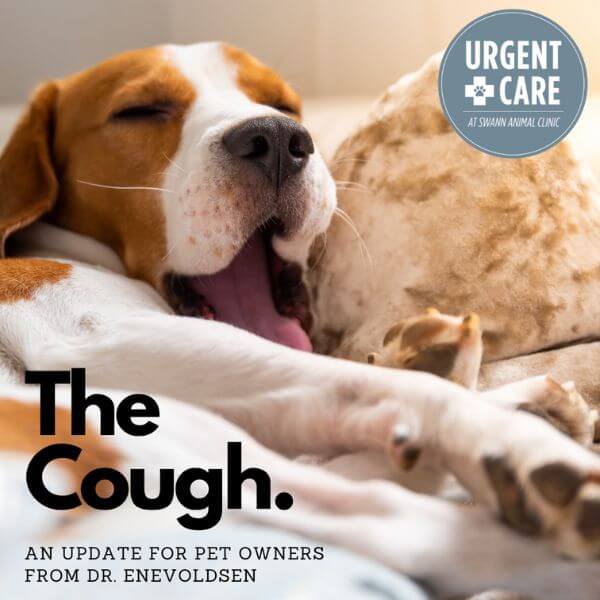
It’s difficult to look at social media recently or turn on the news without seeing something about the new “mysterious and deadly” canine upper respiratory disease that is sweeping the nation. I won’t lie. It caught my attention too! That’s a scary title! Living in the aftermath of COVID, I think we, as a nation, are a little more sensitive to titles like that. It’s understandable. I am going to attempt to share some clarity, give a little insight, and hopefully, settle some nerves. First, let me start by sharing a little bit about me. I am a small animal Urgent and Emergency Care veterinarian. I was made to care for the more intense cases. God created me a little differently to thrive in chaos and enjoy the more complex cases. This means that I have treated A LOT of coughing dogs. All of that to say, I hope my words will carry some weight in the midst of all the scary titles and misinterpretation of information out there right now.
The first thing we need to understand is that a cough is not a disease. It is the symptom of a disease. We also need to understand that there are many causes of coughs – some that have absolutely nothing to do with an infection. For example, one of the more common causes of cough that I treat is heart failure (and antibiotics won’t help with that)! So if your dog starts coughing, please remember, we will still be looking at all sorts of other aspects of your pet to ensure we know where the cough is originating from.
From now on, I will be focusing on infectious upper respiratory disease in dogs. The laymen term for this is “Kennel Cough”. The fancy medical term for it is Canine Infectious Respiratory Disease Complex (CIRDC). This disease complex is endemic in dogs. This means that it is around EVERYWHERE and ALL THE TIME. It has multiple known causes including: canine parainfluenza virus, Bordetella bronchiseptica, canine respiratory coronavirus, canine pneumovirus, canine influenza virus, Streptococcus zooepidemicus, and sometimes Mycoplasma. You will notice that there is a mix of bacteria and viruses – mostly viruses. These pathogens are spread mostly through respiratory secretions (saliva, mucus, etc). This means that they will be spread most quickly through high density areas – groomers, boarding facilities, dog parks, and shelters. When a dog is infected with any of the causes of CIRDC, there are many symptoms that can occur. The most common being a cough. Others include lethargy, oculonasal discharge, fever, pneumonia, and death. The VAST MAJORITY of dogs present with a cough, but are still stable and bright/alert. A few of them will progress (quickly or slowly) to having pneumonia. And yes, unfortunately, a few patients will even pass away from an upper respiratory infection that has progressed. As you can guess, with a broad possibility of symptoms, there is a broad possibility of treatments that your veterinarian may advise. Please be aware, the VAST MAJORITY of dogs just need some time and a little TLC. Some may need a cough suppressant. Some may need oral antibiotics. And a select few may need intensive care in the hospital on IV antibiotics, oxygen, nebulization, and more. But again, what I hope you heard is that CIRDC has been around forever and can be minor or severe. At certain times in history, there are increases in numbers (which then leads to an increase in the number of the more severe cases) in a focal area that then decline again… like what we are seeing now.
So now, let’s take a moment to look at the current “new” (or likely not) disease. In the spring of 2023, the New Hampshire Veterinary Diagnostic Lab reported that they were investigating a potentially novel organism as the cause of respiratory disease in dogs. It is a bacteria that is similar to Mycoplasma they are calling IOLA KY405. Now, please hear, there is absolutely a chance that this is a new bacteria. At one point, all bacteria were new. However, it does not mean that this organism is the cause of a new disease or even a bad bacteria. Most new discoveries turn out to be something that was there all along and does not cause a problem. More research is absolutely needed. In veterinary medicine, we don’t have a high budget for extensive research, so we extrapolate from human medicine. This bacteria has been documented only twice in human medicine – from one lab in Japan in 2014 and 2021. That does not show a giant cause and effect relationship. It is also worth noting that the treatment protocol for these cases has all been supportive – which is similar to how we are already treating upper respiratory tract diseases. In all reality, there are a finite number of possibilities to explain the current situation:
- A multistate outbreak caused by some new bacterium/virus.
- A multistate outbreak caused by our usual suspects, for some reason.
- Unconnected sporadic local outbreaks caused by the usual suspects.
- A slight increase in the baseline disease.
- Our normal disease activity that’s resulted in an outbreak of media attention. I strongly suspect it is a combination of the last two
- an outbreak of media attention piggybacked on a somewhat increased rate of disease that we have seen over the past year. Again, I never want to dismiss the possibility of a new bug. I just want to see the actual evidence before allowing anxiety to rise.
So, with all of that being said. What do you, as a pet owner, need to know? Let’s talk through some things that I hope will give you guidance and peace!
1) Let’s all relax! It seems like there are a few states with an increased incidence of respiratory disease – we see that often. Some of those patients have serious disease – we see that often too! So at this time, being aware is good! Being anxious is bad. And absolutely freaking out is not needed at all.
2) If your dog gets sick, what do you do? My default answer will always be to go to your veterinarian. I would rather you have peace of mind. However, not every coughing dog needs to be seen by a veterinarian. Ask yourself, “If I had their symptoms, would I go to the doctor?” If you were coughing and slightly run down, probably not. However, if you were exhausted or having trouble breathing, you would go! Same thing can be applied to dogs. If your dog is coughing, but overall bright and alert, eating/drinking normally, and breathing normally, it’s not likely that they need to be seen. If, however, it is worse than that – weak/depressed, not eating, trouble breathing, worsening of the disease – then they need to be seen. Also consider the pet individually. If they are elderly, very young, pregnant, immunocompromised, have heart/lung disease already, or are brachycephalic, then they likely need to be seen sooner than other pets. Again, in general, common sense (rather than fear) should dictate our actions.
3) I’m at the vet with my pet, now what?? What will happen at the appointment will vary greatly by veterinarian and how sick your pet is. However, there are a few things I want you to remember:
a) Many coughing dogs do not need any treatment! Just some time and little TLC.
b) If your pet is on the sicker side, your veterinarian will likely want to perform diagnostics like chest x-rays or blood work.
c) If antibiotics are needed, your vet will prescribe it. If they do not, please do not push for them. There is a reason we do not just put every case on antibiotics.
d) If your pet is severely sick, they will likely need to be hospitalized.
4) If your pet is sick and is sent home with you, keep them isolated. We don’t want to spread this disease (even if it is minor) to other pets. A good rule of thumb is to keep them isolated for two weeks.
5) My dog is healthy (yay!). What do I do to keep them that way? The answer is common sense and listening to your veterinarian.
a) Keep them up-to-date on vaccinations. The most important ones for upper respiratory diseases are Bordetella and canine parainfluenza. Canine influenza can be important too, but is much more sporadic in occurrence.
b) Avoid places with high density populations, if possible.
c) If your pet is a high risk pet (old, heart disease, immunocompromised, etc), keep them at home.
Again, I do not want to downplay the concern of pet owners right now and the possibility of a new disease. However, I also do not want fear to control any decision-making for us. As with any emerging issue, we are in the middle of a very fluid situation. We are constantly working to sort out new information about what is happening. However, for the average dog parent, it is still just a matter of common sense and good pet care. Please remember that your veterinarian (not your neighbor, Facebook friend, Tik Tok celebrity, or news anchor) is the absolute best place to get advice. We are on your team and only want what is best for your baby!
